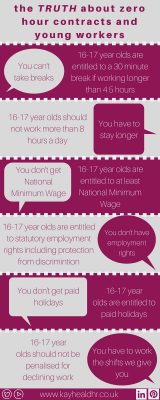Are organisations in Shropshire either turning a blind eye or simply unaware of their responsibilities, particularly with regard to casual hour contracts and young workers?
New ways of working, different categories of worker and the ongoing negative press and confusion about zero hour contracts has created a complicated array of employment options. Although the government has promised to offer some clarity when its commissioned study of modern working practices is completed, in the meantime, employers are pretty much on their own. Unfortunately, a lack of clarity and clear guidelines can lead to poor practice and even exploitation of some workers.
Where does this leave young workers?
According to UNISON young workers are a particularly vulnerable category of worker, due to a general lack of confidence and knowledge. As a result, they are the least likely group of workers to take action against any workplace problems they encounter. Responsible employers should be making sure young workers understand their employment rights.
What is the law regarding employing young workers?
Young workers aged 16-17 years are entitled to the same employment rights as adults when they start a job, but the law also provides additional protection which includes:
- A rest break of at least 30 minutes if the working day lasts more than 4.5 hours
- A usual limit of 8 hours a day and maximum of 40 hours a week
- A minimum of 12 hours’ rest in every 24 hour period, with at least two consecutive days off in every seven-day period
- A limit on night time working unless employed in certain areas such as: agriculture, retail, catering, hotels, post/newspaper deliveries, advertising, sporting, cultural activities and hospitals. No work should be carried out between midnight and 4am.
- Careful consideration regarding their health and safety, so they are not exposed to risk due to a lack of experience or maturity
What about holidays?
All young workers over school leaving age are legally entitled to paid holiday, in exactly the same way as other workers, including those on casual hour or zero hour contracts. On these contracts, holiday is accrued as a percentage of each hour worked.
What about pay?
The national minimum wage for 16-17 year olds is only £4.05 per hour, rising to £5.60 for 18 to 20 year olds. For young workers carrying out the same or similar work as older colleagues, these age bracket wage differences can seem particularly unfair. Less scrupulous employers tend to favour younger workers, who are cheaper to employ and less likely to challenge their employers’ work practices.
I believe strongly that all employers have a responsibility to take care of young workers, keep them safe and give them a positive introduction to employment. Let me know what your experiences have been either as an employer of young people or as a young worker yourself.
If you’d like a JPG or PNG copy of this handy infographic about young workers’ rights, just message me at the bottom of the post:



